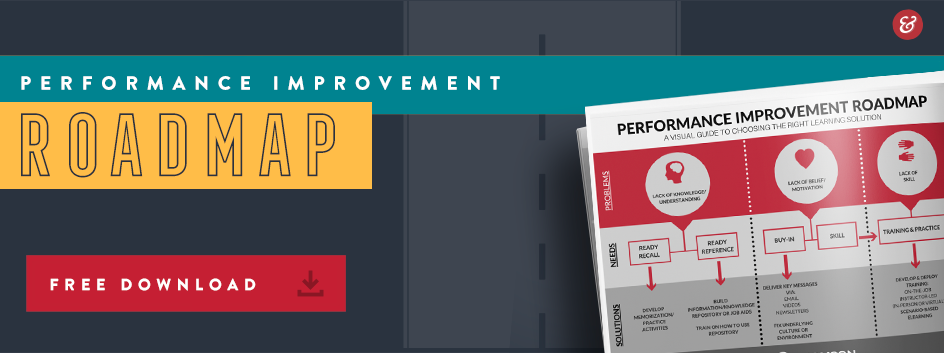Performance Support For Managers
In an organization, there will always be things to complain about or nitpick; perfection is not realistic. Managers are the first to notice when things are incorrect or could be better, but sometimes it’s the teachers who need the extra support rather than the learners. An organization cannot perform at its best without the support of managers and willingness of employees. To be most effective, managers need to support the performance of their employees and identify problem areas proactively. Instead of focusing on what can improve employees, think about what can improve managers, since they are the ones leading and teaching the employees.
Ways to Improve Performance as a Manager
- Build Trust: Begin by instilling trust in your employees, then see if the trust is reciprocated. Do not expect them to trust you because you are a manager; instead make them aware that you trust them, and in return they can trust you. This will encourage them to work hard to meet expectations, and it will build a solid working relationship. Remember to give the trust before expecting to receive it.
- One-On-One Meetings: Provide each employee with the opportunity to meet with you one-on-one. This can be scheduled consistently, which allows them to plan for it and expect it. You could also make it known that they can schedule one-on-one meetings with you at any time. Be open and honest with them each time so they take advantage of the opportunity to speak one-on-one with you.
- Stay Humble About Your Intelligence and Position: It is important that employees feel comfortable with you and not inferior. You want them to come to you when they do not understand something without them feeling uncomfortable or that they are lacking intelligence. Make them feel important and capable; that is the reason you hired them.
- Do Not Micro-Manage: If you hire capable and intelligent employees there is no reason to micro-manage them. This can create anxiety, frustration, hostility, and lack of trust in the workplace resulting in employee turnover and decreased productivity. It is important to let your employees do their job, while helping them when they ask for it. Make yourself constantly available to them without overstepping or making them feel incapable in their position.
- Be Present: It is important that you make yourself present throughout the workday. Do rounds throughout the day and check in with your employees to reassure them that you are there to help. It is comforting to the employee to know that the support is there and accessible whenever they need it.
- Provide Continuous Information: Employees love to know what is going on in the organization, it is important that they feel part of the team. Provide as much information as you possibly can daily. Give updates on events and projects, even if they are not related to a certain department. This will keep everyone on the same page, and it will create unity within the workplace.
- 3:1 Ratio: The 3:1 ration is the amount of positive feedback you give compared to the amount of constructive criticism. You can help your employees where it is needed, but make sure to give three times as much positive feedback during the constructive process. Make sure when you are helping or teaching that you are building up their confidence and not tearing them down.
- Continue Learning: You need to continue learning to stay beneficial to your employees. If you stop learning, there is no way you can continue to help and teach your employees. Manager skills do not stop; there is always room for improvement and constant changes that need to be taught in order to continue succeeding. Be open and willing to learn and change your management style if needed. Progress needs to be continuous even at a management level.
- Encourage Breaks and Time Off: Pushing work and deadlines is part of a lot of jobs but there should be availability for your employees to take breaks throughout the day. Do not make them feel as though the work is more important than their mental health; the health of your employees should always come first. Having set times throughout the day for breaks will help with productivity and burnout. It is also important that you encourage your employees to use their vacation days and PTO. These mental breaks from work are extremely important and the employee should feel comfortable using this earned time.
There is an immense amount of pressure and responsibility that comes along with being a manager in the modern workplace. Supporting your employees and providing them with help will improve their performance immeasurably. When there are things that need to be improved on, first look at what you can do as a manager and then see what needs to be done on the employee level. Some things are a result of the managers doing or in some cases not doing and should never be placed as blame on the employee. Managers are there for more than just management reasons, and their performance in the organization can have a bigger impact than the performance of the employees. Stay up to date on training for yourself and for your employees, encourage questions, give trust, and allow for improvement in yourself as well as in your employees. A manager can directly improve their employees’ performance, but they must be aware of their own performance and how they present themselves to their employees. A team is only as strong as the weakest link, and it is the managers job to support the performance of the entire team.

Continue reading

Dashe joins ttcInnovations
Learn More
Embracing the Future: Early Adopters of Generative AI for Learning
Learn More
Four Areas To Consider When Designing Accessible Training
Learn MoreCommitted to
finding solutions
